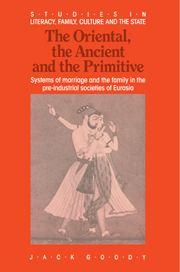 The Oriental, the Ancient and the Primitive
The Oriental, the Ancient and the Primitive Published online by Cambridge University Press: 09 January 2010
The discussion of the continuing importance of the brother–sister relationship in Gujarat and other parts of India is a convenient point at which to shift from a consideration of hierarchical differences to a comparison and contrast of North India with the South and Sri Lanka. Any such attempt raises an obvious problem. Many of the hierarchical differences we have noted are pan-Indian, particularly where Brahmins are involved, for example, in the southern village of Kumbapettai studied by Gough (1981), a main reference of the group is to a common set of written norms; people may interpret these differently, even setting them aside altogether but their very embodiment in a text means that by calling attention to such discrepancies, it is always possible for reformers to lead them back to more ‘Sanskritic’ ways. In other words, there is a certain dynamic tension between the Dharmaśāstra and the customary ‘law’ which results in a change in the balance over time.
But at any point in time differences always exist, both hierarchical and regional, and the problem is that in trying to point these out, one may inevitably overemphasise. However, the fact that differences do exist is widely recognised by actors and observers alike. Their importance is a matter for debate; nevertheless even their existence tends to be denied or played down by those approaches to the study of Indian systems of kinship and marriage that stress the unity of Indian culture, whether because they assume a common deep structure for the whole country (or sub-continent) or whether because they concentrate, explicitly or implicitly, upon the unity of written Hindu orthodoxy.
To save this book to your Kindle, first ensure [email protected] is added to your Approved Personal Document E-mail List under your Personal Document Settings on the Manage Your Content and Devices page of your Amazon account. Then enter the ‘name’ part of your Kindle email address below. Find out more about saving to your Kindle.
Note you can select to save to either the @free.kindle.com or @kindle.com variations. ‘@free.kindle.com’ emails are free but can only be saved to your device when it is connected to wi-fi. ‘@kindle.com’ emails can be delivered even when you are not connected to wi-fi, but note that service fees apply.
Find out more about the Kindle Personal Document Service.
To save content items to your account, please confirm that you agree to abide by our usage policies. If this is the first time you use this feature, you will be asked to authorise Cambridge Core to connect with your account. Find out more about saving content to Dropbox.
To save content items to your account, please confirm that you agree to abide by our usage policies. If this is the first time you use this feature, you will be asked to authorise Cambridge Core to connect with your account. Find out more about saving content to Google Drive.